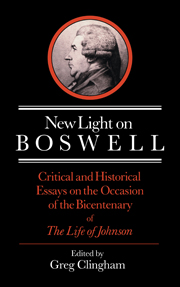 New Light on Boswell
New Light on Boswell Book contents
- Frontmatter
- Contents
- Notes on contributors
- Preface
- Acknowledgements
- Abbreviations
- 1 Introduction: Boswell's ambiguities
- Part I BOSWELL AND EIGHTEENTH-CENTURY SCOTTISH CULTURE
- 2 Boswell and the rhetoric of friendship
- 3 Scottish divines and legal lairds: Boswell's Scots Presbyterian identity
- 4 Boswell and the Scotticism
- 5 Boswell as critic
- Part II CONTEXTS FOR THE LIFE OF JOHNSON
- Part III THE LIFE OF JOHNSON RECONSIDERED
- Index
4 - Boswell and the Scotticism
Published online by Cambridge University Press: 28 October 2009
- Frontmatter
- Contents
- Notes on contributors
- Preface
- Acknowledgements
- Abbreviations
- 1 Introduction: Boswell's ambiguities
- Part I BOSWELL AND EIGHTEENTH-CENTURY SCOTTISH CULTURE
- 2 Boswell and the rhetoric of friendship
- 3 Scottish divines and legal lairds: Boswell's Scots Presbyterian identity
- 4 Boswell and the Scotticism
- 5 Boswell as critic
- Part II CONTEXTS FOR THE LIFE OF JOHNSON
- Part III THE LIFE OF JOHNSON RECONSIDERED
- Index
Summary
A well-known passage in Humphry Clinker (1771) serves to focus linguistic issues which bear on the Scottish Enlightenment, and which help to illuminate Boswell's attitudes in relation to the dominant intellectual movement of his time. At Durham, Smollett's party of travellers have encountered the eccentric, indeed consciously Quixotic, figure of Lismahagow. Soon afterwards, on July 13, Jery Melford writes to his friend Sir Watkin Phillips of the first major contretemps involving Lismahagow, when the grizzled lieutenant sets out a paradoxical case:
He proceeded to set out his assertion that the English language was spoken with greater propriety at Edinburgh than in London. – He said, what we generally called the Scottish dialect was, in fact, true, genuine old English, with a mixture of some French terms and idioms, adopted in a long intercourse betwixt the French and Scots nations; that the modern English, from affectation and false refinement, had weakened, and even corrupted their language, by throwing out the guttural sounds, altering the pronunciation and the quantity, and disusing many words and terms of great significance. In consequence of the these innovations, the works of our best poets, such as Chaucer, Spenser, and even Shakespeare, were become, in many parts, unintelligible to the natives of South-Britain, whereas the Scots, who retain the ancient language, understand them without the help of a glossary.
Lismahagow goes on to give a number of detailed instances in support of his claim, arguing that the “energy” of southern English had been “impaired” by the false refinements mentioned, and that an overall vowel-shift had made the language unlike any other European tongue, and thus difficult for foreigners to acquire.
- Type
- Chapter
- Information
- New Light on BoswellCritical and Historical Essays on the Occasion of the Bicententary of the 'Life' of Johnson, pp. 56 - 71Publisher: Cambridge University PressPrint publication year: 1991
- 3
- Cited by


